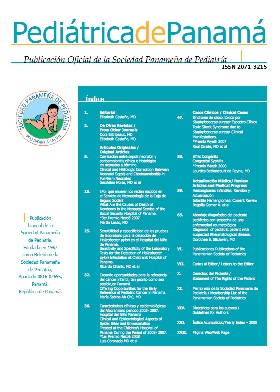Back to school
Authors
DOI:
https://doi.org/10.37980/im.journal.rspp.20211798Keywords:
school, back to schoolAbstract
The position of the Panamanian Society of Pediatrics on the return to school is expressed in its communiqué of August 24, 2021 to the community "the SPP reiterates that the return to school is urgent, but under strict biosecurity measures such as frequent hand hygiene with soap and water or disinfectants containing at least 70% alcohol, use of masks covering the mouth and nose, maintaining good ventilation and a minimum physical distance of 1 meter. That the epidemiological behavior of the disease in the different communities should be taken into account". This position is reinforced by statistics, 90% of teachers and school administrators are vaccinated, since the beginning of August 2021 vaccination began in sweep of over 12 years, 60% of the population has received at least 1 dose of the vaccine and 36% two doses, despite the third wave cases have continued to decline with vaccination.
According to Unicef in its report1 , nearly 60% of school-age children in the Latin American region missed the school year. And two thirds of the countries where most schools are permanently closed are in our region. Unicef reports that, on average, schools in Latin America and the Caribbean remained closed for 158 days, far exceeding the global average of 95 days of closure, while Panama is the country with the highest number of days without face-to-face or semi-presential education, 16 months (480 days).
Schools, the study adds, were only open for six days on average between March 2020 and February 2021 at the Latin American level and globally that figure is 37 days.
The Panamanian Ministry of Education (Meduca) foresees a return to on-site classes by 2022, once 80% coverage is reached by the end of 2021 and will follow the indications of the Ministry of Health. But we must remember that schools provide more than just academic learning to children and adolescents is not only reading, writing and learning subjects such as math, science, Spanish; students also learn social and emotional skills, exercise, have access to internet, the use of the school canteen (which for many in Latin America in areas of extreme poverty represents their only daily meal).
The American Academy of Pediatrics (APP)2 notes that research has shown that the opening of schools generally does not significantly increase community transmission if implemented with the requirement for facemasks and other safety measures. That concerns about the emergence of COVID-19 variants (such as delta) may increase the risk of transmission and lead to worsening disease, it has been shown that given the effectiveness of safety precautions when masks are worn consistently, children are at increased risk for mental health problems and developmental delays if they miss out on learning in school.
Downloads
Published
Issue
Section
License
Copyright (c) 2021 Pediatric Journal of PanamaDerechos autoriales y de reproducibilidad. La Revista Pediátrica de Panamá es un ente académico, sin fines de lucro, que forma parte de la Sociedad Panameña de Pediatría. Sus publicaciones son de tipo gratuito, para uso individual y académico. El autor, al publicar en la Revista otorga sus derechos permanente para que su contenido sea editado por la Sociedad y distribuido Infomedic International bajo la Licencia de uso de distribución. Las polítcas de distribución dependerán del tipo de envío seleccionado por el autor.






